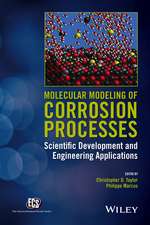Electrochemistry of Cleaner Environments
Editat de John Bockrisen Limba Engleză Paperback – 8 mar 2012
Preț: 388.13 lei
Nou
Puncte Express: 582
Preț estimativ în valută:
74.27€ • 79.42$ • 61.92£
74.27€ • 79.42$ • 61.92£
Carte tipărită la comandă
Livrare economică 17 aprilie-01 mai
Preluare comenzi: 021 569.72.76
Specificații
ISBN-13: 9781468419528
ISBN-10: 1468419528
Pagini: 312
Ilustrații: XIV, 296 p. 23 illus.
Dimensiuni: 152 x 229 x 16 mm
Greutate: 0.42 kg
Ediția:Softcover reprint of the original 1st ed. 1972
Editura: Springer Us
Colecția Springer
Locul publicării:New York, NY, United States
ISBN-10: 1468419528
Pagini: 312
Ilustrații: XIV, 296 p. 23 illus.
Dimensiuni: 152 x 229 x 16 mm
Greutate: 0.42 kg
Ediția:Softcover reprint of the original 1st ed. 1972
Editura: Springer Us
Colecția Springer
Locul publicării:New York, NY, United States
Public țintă
ResearchCuprins
1 The Electrochemical Future.- I. Introduction.- II. Transportation.- III. Electrochemical Powering of Transportation.- IV. Illusions in Respect to the Electric Automobile.- V. Metallurgy.- VI. Electrochemical Synthesis.- VII. Dirty Liquids.- VIII. Sewage and Rubbish.- IX. Electroextractions.- X. Detecting Devices.- XI. The Hydrogen Economy.- XII. The Agro- (and Urban) Nuclear Complex.- XIII. The Electrochemical World.- XIV. Research Funding.- XV. Education.- 2 The Influence of the Combustion of Fossil Fuels on the Climate.- I. Introduction.- II. Calculation of Temperature Changes.- III. Carbon Dioxide Balance.- IV. Carbon Dioxide Exchange between Oceans and Atmosphere.- V. Evidence from Past Climates.- VI. Carbon Dioxide from Fossil-Fuel Combustion.- References.- 3 Electrochemical Power Sources for Vehicle Propulsion.- I. Introduction.- II. Incentives for Electric Vehicles.- 1. Conservation and Utilization of Fossil-Fuel Supplies….- 2. Future Changes in Energy Sources.- 3. Environmental Pollution.- III. Obstacles to Electric Vehicles.- IV. Vehicle Power-Plant Requirements.- V. Current Battery Technology.- VI. Emerging Battery Technology.- VII. Projections of Electric Power-Plant Development.- References.- 4 The Electrochemical Treatment of Aqueous Effluent Streams.- I. Introduction.- II. Electrodialysis and the Concentration of Effluent Streams….- III. Electroflotation Processes.- IV. Cathodic Processes—Recovery of Metals.- V. Anodic Destruction Processes.- 1. Fundamentals of the Process.- 2. Cyanide Destruction.- 3. The Chloride-Cyanide Process.- 4. Electrochemical Sterilization of Domestic Wastes.- 5. The Electrochemical Destruction of Other Organic Compounds.- VI. Conclusions.- References.- 5 The Electrofiltration of Particulates from Gases.- I. Introduction.-II. The Broad Principle of Electrostatic Precipitation.- III. The Deutsch Equation.- IV. The Particle Migration Velocity.- V. Agreement between Theory and Observation.- VI. Electrical Aspects of Precipitation.- VII. Structure and Dislodgment of Collected Dust.- VIII. The Present Technical Outlook.- Acknowledgments.- References.- 6 Electrochemical Methods of Pollution Analysis.- I. Introduction.- II. Air Pollution Monitoring.- III. Water Pollution Monitoring.- References.- 7 The Prospect of Abundant Energy.- I. Introduction.- II. Energy Supply through Reactors.- III. Size Appropriate to Needs.- IV. Power Distribution.- V. Energy Centers.- VI. Power Conversion Equipment and Affect on Costs.- VII. Social and Environmental Aspects of Low-Cost Energy.- VIII. Conclusion.- References.- 8 The Hydrogen Economy.- I. Introduction.- II. Economic Considerations.- III. Hydrogen Production.- IV. Hydrogen Transmission, Storage, and Distribution.- V. Hydrogen-Fueled Equipment.- VI. Local Electrical Generation from Hydrogen.- VII. Hazards and Safety Aspects of Hydrogen.- VIII. Hydrogen as a Chemical Raw Material.- Acknowledgments.- References.- 9 Hydrometallurgical Treatment of Sulfide Ores for Elimination of SO2 Emissions by Smelters.- I. Introduction.- II. Hydrometallurgical Procedures for the Recovery of Metal.- III. Electrode Systems in Electrolysis.- References.




